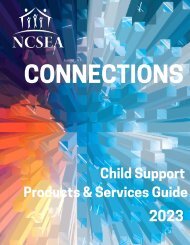April 2024 CSQ
You also want an ePaper? Increase the reach of your titles
YUMPU automatically turns print PDFs into web optimized ePapers that Google loves.
of the Tax Reduction Act of 1975. Over the<br />
years, the EITC was expanded to include<br />
increases in the maximum credit amount,<br />
broader eligibility criteria, and additional<br />
benefits for families with more children.<br />
The EITC provides low to moderate-income working individuals and<br />
families with a reduction in the amount of taxes owed or a refund if the<br />
credit exceeds the tax liability. The EITC was designed to serve as a work<br />
incentive to encourage individuals to seek and maintain employment,<br />
thereby promoting workforce participation and reducing reliance on cash<br />
assistance.<br />
To be eligible for the EITC, a taxpayer must<br />
have earned income from employment, selfemployment,<br />
or certain other sources, and<br />
meet certain income limits. In addition,<br />
individuals can claim a larger amount of the<br />
EITC if they care for a “qualifying child” in<br />
their home for more than half of the year. A<br />
“qualifying child” is defined as a child under<br />
age 19 at the end of the tax year (or under age 24 if a full-time student).<br />
The Child Tax Credit (CTC)<br />
While the EITC is available to individuals with or without<br />
minor children in the household, the credit is substantially<br />
larger for those with children. The CTC, however, is<br />
available only to families who will claim one or more<br />
qualifying children as dependents when filing their tax<br />
returns. A qualifying child must:<br />
• Be under age 17 at the end of the year;<br />
• Live with the parent for more than half the year; and<br />
• Be properly claimed as a dependent on the parent’s tax return.<br />
Parents can qualify for the full amount of the CTC if they meet all eligibility<br />
factors and their annual income does not exceed $200,000.<br />
Differential impacts of the EITC and CTC on parents who live apart<br />
While the EITC and the CTC primarily benefit families with children, the<br />
EITC and CTC do not apply equally to parents who live apart. Generally,















